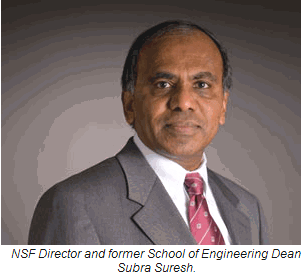|
News & Views item - November 2011 |
![]() NSF Director Subra Suresh Announces New Program to Fund "Out-of-the-box Ideas".
(November 10, 2011)
NSF Director Subra Suresh Announces New Program to Fund "Out-of-the-box Ideas".
(November 10, 2011)
 Subra
Suresh was the head of MIT’s Department of Materials Science and Engineering
when US President Barack Obama invited him to take over the Directorship of the
US' National Science Foundation (NSF). The US Senate confirmed his appointment
on October 18, 2010.
Subra
Suresh was the head of MIT’s Department of Materials Science and Engineering
when US President Barack Obama invited him to take over the Directorship of the
US' National Science Foundation (NSF). The US Senate confirmed his appointment
on October 18, 2010.
Yesterday Dr Suresh announced a new initiative in response to a long standing criticism of the Foundation that it was not sympathetic to potentially transformative research.
The new program (CREATIV, i.e. Creative Research Awards for Transformative Interdisciplinary Ventures), will offer grants of up to $1 million over 5 years, and what will set the program apart is that proposals will not be judged by external review panels. Instead, researchers must convinced NSF program managers by first receiving prior, written approval from at least two of them before even submitting a proposal. Once obtained the NSF promises to make a decision within 2 or 3 months. That's more than twice as fast as the usual turn-around time. Researchers from U.S. institutions can submit proposals in any area that NSF now funds, and there are no priority topics.
Dr Suresh emphasised that while not every research proposal is right for CREATIV the NSF is looking for "unusually innovative, unconventional, high-risk, and interdisciplinary proposals without a recognizable home" within the foundation. The last adjective—interdisciplinary—is the real driver, he explained, as NSF tries to tackle some of "the most complicated problems … in the richest and most fertile domains."
Current budget request before Congress designates US$24 million for CREATIV in 2012. Richard Behnke, co-chair of the internal committee that designed CREATIV, told ScienceInsider that the projected amount might support 40 to 50 awards.
In fact Dr Suresh has indicated that CREATIV is part of an initiative given the acronym INSPIRE (Integrated NSF Support Promoting Interdisciplinary Research and Education) which he hopes will eventually have a budget of US$120 million (by 2016) and could include a new program to support larger interdisciplinary research teams.
Dr Behnke assured questioners that CREATIV would not undermine NSF's traditional merit-review process noting that even at its projected maximum size, it would represent less than 2% of NSF's overall research budget: "For the great majority of proposals, we will continue the traditional merit-review process. The gold standard remains in place, [but] it's a new way of doing business at NSF … and we hope it succeeds."